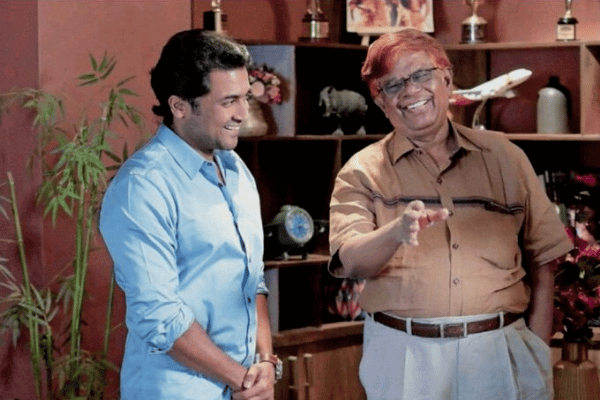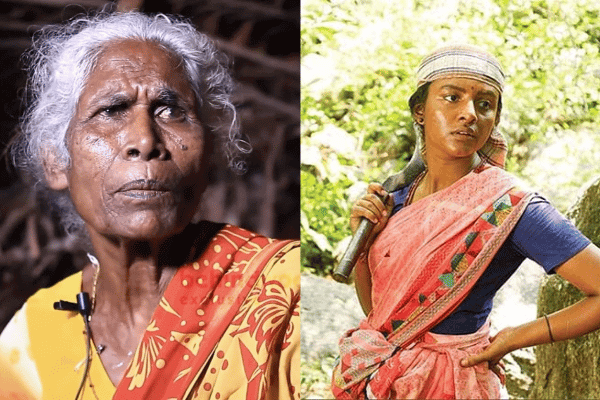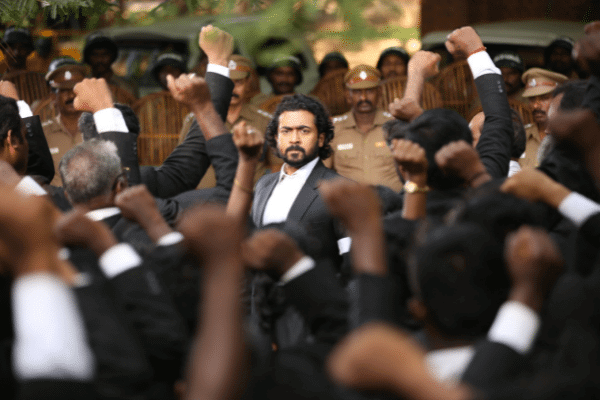Tamil film ‘Jai Bhim’ has notably surpassed The Godfather and The Shawshank Redemption on IMDB with an unbelievable rating of 9.8 stars out of 10.
The film is based on a real tribal case from 1993 fought by Justice K Chandru. Directed by T J Gnanavel and starring Tamil acting legend Suriya in a lead role, Jai Bhim on Prime Video is a must-watch for film buffs of every background, especially Indian.
The plot, mainly driven by a human rights lawyer’s efforts to help a tribal woman whose husband has been wrongfully jailed, feels like an obvious recipe for success.
Satyamev Jayate is India’s national motto; and as Indians, it is in our blood, we crave to see the triumph of truth over evil.

The film opens with local police officers separating criminals according to caste; higher caste ones are free to go, while lower caste and tribal offenders will be slapped with more cases and tortured into confessing false crimes to benefit the police’s corrupt agendas.
Then, we see how the tribal Irular community lives. They build brick houses for the upper caste community while their own mud houses are washed away by rains, and their livelihoods can be loosely defined as unpaid pest exterminators.
We witness the tribal community constantly being ‘put in their place’ by upper-caste members. The latter is shown to practice untouchability, and discourage the tribals from obtaining ration cards, voter ID cards, even tribal certificates to avail benefits like food and education.

Deeply moving depictions of explicit discrimination and microaggressions against the tribal community pinch you every time. Central characters Sengani (Lijo Mol Jose) and Rajakannu’s (Manikandan) portrayal of a loving tribal couple’s aspirations for the future will bring empaths to their knees.
However, the story begins when the police seek Rajakannu regarding the theft of stolen jewels, but arrest most of his relatives too, including his pregnant wife.
Seek is actually a nice word for the police’s treatment of tribal people in the film because their interrogation tactics are worse than the war crimes committed by CIA-backed troops in Afghanistan.
And since it is worse, the question arises; how is the rest of the world still unaware or indifferent to the suffering of India’s minorities? The film highlights the root of the problem as –they are orphans in their own country.
The plot of T J Gnanavel’s Jai Bhim puts on display the endless possibilities that can result from using one’s privilege and power to stand up for someone that has none.
A human rights lawyer working 24/7 pro bono delivered justice better than any police officer and high Court judge in the film. In this way, Jai Bhim emphasises the role of law in society, and that all it took was a good lawyer who used the law to deliver justice rather than escaping it.
Also, the dialogues and acting in this film are incredibly powerful.
‘One truth to hide many others.’
‘I don’t believe in luck; I believe in the truth.’
‘Beyond the words of support for justice, the court’s silence towards injustice is more dangerous.’
‘Criminals have caste, money, and power to back them up. But the victims? We are all they have.’
‘The law is a very powerful weapon, what’s important is who we protect by using it.’

If you’re like me and love Indian cinema and the catharsis that can come from it, then you know that, for a while, Bollywood has simply been bad.
B-wood has been relying on bland actors because they are popular/conventionally attractive, widespread promotions, and hyped-up songs rather than the content of each frame to wow the audience.
Bad cinema is not good for a population; it is uninspiring, condescending, irresponsible and actually makes audiences more obtuse.
As Anurag Kashyap noted in Gangs of Wasseypur, ‘Hindustaan mein jab take sanima hai, log chutiya bante rahenge’ (as long as there are films in India, people will keep getting fooled).
Bollywood has miles to go before it can produce Kaala, Asuran, Karnan or even a Jai Bhim. All filmmakers in Hindi, Bengali new wave cinema were dominant castes, whereas Tamil new wave movies are made by Dalit and OBC directors: @Profdilipmandal https://t.co/peshEpPmE0
— rama lakshmi (@RamaNewDelhi) November 21, 2021
In recent times, most agree that Tamil cinema has picked up the baton for critically acclaimed Indian films.
While movies are entertaining and a way to unwind, they are also a reflection of society. Unpopular opinion (but popular among cinephiles) – filmmakers have a responsibility to not waste resources and the audience’s time in pursuit of box office collections.
Instead, mainstream filmmakers, especially, must realise that they can produce meaningful art which has the power to influence millions to know better, and be better.
Don’t let subtitles stop you, watch the film now!





